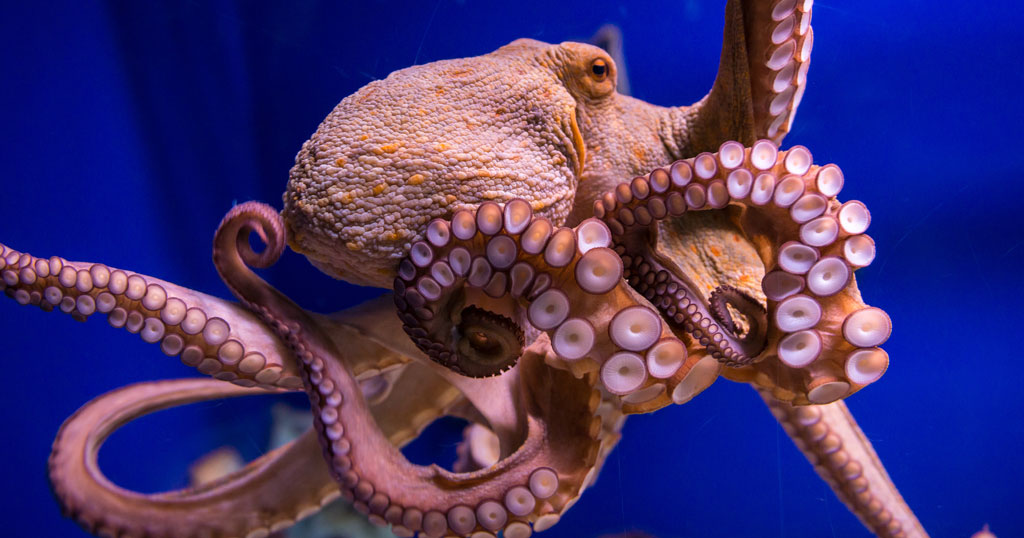
In the murky depths of the ocean live some of the smartest and most unusual creatures to inhabit the earth. Octopuses are known for their sucker covered tentacles and chameleon-like abilities to change color, pattern and shape to blend it with their environment. The changes aren’t limited to just their appearance. A new study published in Cell reveals that they can change their brains as well (1). The study found that octopuses recode their brain in response to environmental temperature changes using RNA editing.
RNA Editing Was First Identified in Squid
Scientists have known for several years that coleoid cephalopods (i.e., octopus, squid and cuttlefish) are unusually adept at editing their RNA. The phenomenon was first discovered in 2015 when a study of the common squid (Doryteuthis pealeii) revealed that close to 60% of their mRNAs were edited (2). That study found that the majority of transcripts in the squid nervous system are extensively recoded by A-to-I RNA editing.
A-to-I RNA Editing
A-to-I editing occurs when enzymes called adenosine deaminases (ADARs) are activated and convert select adenosine (As) to inosines (Is) through hydrolytic deamination. Unlike coleoids, in most animals the majority of these editing sites are found outside of mRNA coding regions (3). In humans, for example, fewer than 3% of genes are affected by RNA editing.
When RNA editing occurs in coding regions, the A to I change has phenotypic repercussions because Is interact with other bases and are translated as guanosines (Gs). In sophisticated cephalopods such as octopus and squid, RNA editing can (and does!) recode most of their neural proteins (3). This editing ability allows coleoids to transiently alter a protein without changing the gene.
Octopuses Edit Their RNA When Temperatures Get Colder
With RNA editing so prolific in coleoids, the obvious question is: what factors cause these animals to edit their RNA so extensively? To try to answer this question, researchers led by scientists from the Marine Biological Laboratory and Tel Aviv University used a species with a genome that had been fully sequence, the California two-spotted octopuses (Octopus bimaculoides) and focused on an environmental condition that they knew fluctuated in the animal’s natural habitat, temperature. Environmental temperature changes are a significant factor because coleoids cannot regulate their body temperature, which, as a result, will rise and fall with the water around them.
There are close to 60,000 known RNA editing sites in the O. bimaculoides genome. By acclimating wild-caught animals in tanks held at different temperatures within their natural temperature range (55°F or 72°F) the researchers investigated what, if any, RNA editing events occurred. Their findings indicated that close to one third of those sites change in response to changes in temperature, with most changes induced when the water temperature decreases. To confirm this, the researchers looked for, and found, the same cold-induced changes in wild-caught animals of a closely related octopus species— Verrill’s two-spot octopus (Octopus bimaculatus).
RNA Editing Changes Proteins Involved in Neurological Functions
Among the changes the team identified were ones that affect proteins involved in neurotransmitter release and the transmission of neurological signals. For kinesin-1, which is a motor protein involved in axonal transport, the cold-induced RNA editing appears to regulate the transport speed down microtubules. For a second protein involved in calcium-dependent neurotransmitter release, synaptotagmin, the edits altered calcium binding dynamics by lowering the binding efficiency of the first bound Ca2+ ion but leaving the binding efficiency of the second Ca2+ molecule unchanged.
Conclusion
Because coleoids use RNA editing so extensively, the results of this study are probably just the beginning steps to understanding how these creatures adapt to their environment. Investigating how and why these creatures use this ability so prolifically will not only increase our understanding of these strange and beautiful creatures but might also give insight into certain cancers and neurological disorders in humans where RNA editing has been implicated.
References
- Birk, M.A. et al. (2023) Temperature-dependent RNA editing in octopus extensively recodes the neural proteome. Cell 186, 2544–55.
- Alon S. et al. (2015) The majority of transcripts in the squid nervous system are extensively recoded by A-to-I RNA editing. Elife, 4, e05198.
- Rosenthal and Eisenberg (2023) Extensive Recoding of the Neural Proteome in Cephalopods by RNA Editing. Annu. Rev. Anim. Biosci. 11, 57–75.
Kelly Grooms
Latest posts by Kelly Grooms (see all)
- The Battle of Shiloh’s Angel’s Glow: Fact, Civil War Legend or Modern Myth? - July 11, 2024
- Mind Control, Mutilation and Death. The Fungal Fate That Lurks in Waiting for Emerging Periodical Cicadas - June 13, 2024
- Measles and Immunosuppression—When Getting Well Means You Can Still Get Sick - May 13, 2024
